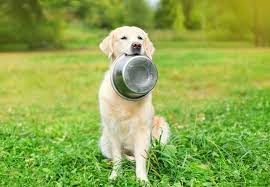You might ask yourself, “can I give my dog milk for constipation,” since you’re unsure of what solutions to take. Caring for your canine companion is one of the best parts of being a dog owner. Feeding, bathing, and keeping your dog healthy help build a relationship between you.
Over time this bond can be unbreakable. Most of the time, it is easy to provide your dog’s care. Unfortunately, there are moments when this can become more difficult, namely, if your dog gets sick. One of the most common health issues that dog owners face is constipation.
Constipation in dogs can be uncomfortable and even painful for your furry friend. If your dog is constipated, you may wonder if there are any easy home remedies. One of the most common ones is milk for dog constipation. However, dogs don’t typically consume dairy, so that you might wonder: can dogs drink milk for constipation?
However, many dog owners are unsure if they can give their dog milk. Don’t worry. This article has you covered. We will cover everything you need to know about dog constipation, its symptoms, causes, and the treatments you can use to get your furry friend back to total health.
Before you scroll down to a more in-depth answer with alternatives to this question, “Can I Give My Dog Milk For Constipation,” you can check out these other dog-related guides from our team at We Love Doodles: Can Peanut Butter Make My Dog Constipated?
What is Constipation For Dogs?
Before considering whether milk is a good constipation remedy for your dog, let’s first look at what constipation is. Constipation is defined as having fewer than three bowel movements in a week. If your dog is constipated, it cannot expel waste from its body. Over time, this can cause serious health problems.
More Dog-Related Guides: MiraLAX For Dogs and Why Does My Dog Walk Around and Poop?
Symptoms of Constipation in Dogs
If you think your dog may be constipated, there are several symptoms you can look for.
The most common symptoms of constipation in dogs are:
- Straining to defecate
- Having hard stools
- Passing little to no stool
- Bleeding from the anus
- Loss of appetite
- Vomiting
- Lethargy
- Abdominal pain
If you notice any of these symptoms, you must take your dog to the vet as soon as possible. They will be able to give you a definitive diagnosis and help you create a treatment plan.
More Dog-Related Guides: Why is My Dog’s Poop Grainy and How Often Do Puppies Poop?
Causes of Dog Constipation
Several different things can cause constipation in dogs.
The most common causes of dog constipation are:
- Dehydration: Dehydration is one of the dogs’ most common causes of constipation. If your dog isn’t drinking enough water, its stool will become hard and difficult to pass.
- Diet: A lack of fiber in your dog’s diet can also lead to constipation. Fiber helps to add bulk to the stool, making it easier to pass.
- Certain health conditions: Several health conditions can cause constipation. These include digestive disorders, neurological problems, and endocrine diseases.
- Blockages: Blockages in the intestines can also cause constipation. Tumors, foreign bodies, or hairballs can cause blockages in your dog’s intestines.
- Lack of Exercise: If your dog isn’t getting enough exercise, this can also lead to constipation. Exercise helps to keep the digestive system moving, which can help to avoid constipation.
- Side Effects: If your puppy takes medication, constipation can be a common side effect.
More Dog-Related Guides: Best Dog Food For Less Poop and How Long Will My Puppy Poop Worms After Deworming?
What Are The Treatments For Dog Constipation?
You can try several treatments if your dog is constipated due to a relatively benign cause like lack of exercise, poor diet, or dehydration.
Here’s a list of treatments for dog constipation:
1. Milk and Dairy
Many dog owners ask whether I can give my dog milk for constipation. The answer is yes, you can. Milk and other dairy products are good sources of fiber. Fiber can help to add bulk to the stool, making it easier to pass. In addition, milk is a natural laxative. Laxatives can help to soften the stool and make it easier to pass.
Just be sure not to give your dog too much milk, which can lead to diarrhea. If your dog is lactose intolerant, you can also try giving them almond milk to alleviate dog constipation. Almond milk is lactose-free milk that can still provide the same constipation-relieving benefits.
More Dog-Related Guides: Can Dogs Have Condensed Milk?
2. Pumpkin
Pumpkin is another home remedy that can effectively treat constipation in dogs. Pumpkin is a good source of fiber and can help to add bulk to the stool. In addition, pumpkin is a natural laxative that can help to soften the stool and make it easier to pass. You can give your dog canned pumpkin or cooked pureed pumpkin. Be sure not to provide your dog with pumpkin pie filling, as this can harm dogs.
More Dog-Related Guides: Can Dogs Eat Rice Krispies and Can Dogs Eat Raw Chicken Breast?
3. Exercise and Fresh Water
As we mentioned earlier, constipation can be caused by a lack of exercise. If your dog isn’t getting enough exercise, this can lead to a build-up of stool in the intestines. To help treat constipation, make sure your dog is getting enough exercise. Take your dog on walks or runs, or play fetch with them in the yard.
In addition, make sure your dog has access to fresh, clean water at all times. Dehydration is a common cause of constipation, so it’s essential to make sure your dog stays hydrated. If your dog is constipated, you can also try adding a little bit of water to their food. Some moisture can help to add moisture to the stool, making it easier to pass. If it doesn’t want water, you can try to trick your dog into drinking water.
More Dog-Related Guides: What Should I Do If My Dog Drinks Water Too Fast and Why Does My Dog Cough After Drinking Water?
4. Give Fido Fiber
If your dog isn’t getting enough fiber in their diet, this can lead to constipation. To help add bulk to the stool and make it easier to pass, try adding some fiber to your dog’s diet.
There are several high-fiber foods that you can add to your dog’s diet, including:
- Pumpkin
- Sweet potatoes
- Oatmeal
- Broccoli
- Carrots
- Cauliflower
You can also give your dog a fiber supplement. Be sure to consult a vet before giving your dog any supplements, as too much fiber can be harmful.
More Dog-Related Guides: Best Dog Foods For Firm Stools and Best Dog Scooting Treatments.
5. Probiotics and Supplements
Probiotics are live bacteria that are beneficial for gut health. These can help to increase the good bacteria in your dog’s gut and improve digestion. In addition, probiotics can help to relieve constipation.
You can find probiotics in many different forms, including supplements, powder, and yogurt. Be sure to talk to your vet before giving your dog probiotics, as some brands may not be safe for dogs. In addition to probiotics, several other supplements can help relieve constipation.
These include:
- Psyllium husk
- Marshmallow root
- Slippery elm bark
Psyllium husk is a type of soluble fiber that can help to add bulk to the stool and make it easier to pass. Marshmallow root can help to soothe the digestive tract and relieve constipation. Slippery elm bark can also help to alleviate the digestive tract and ease constipation. These supplements are all-natural.
More Dog-Related Guides: Best Salmon Oil Supplements For Dogs and Best Muscle Growth Supplements For Dogs.
6. Vitamin C
Vitamin C is a water-soluble vitamin that is essential for good health. This vitamin helps to boost the immune system and promote healing. In addition, vitamin C can help to relieve constipation. You can give your dog vitamin C supplements. Be sure to talk to your vet before giving your dog any supplements, as too much vitamin C can be harmful.
More Dog-Related Guides: Best Dog Food with Vitamins and Minerals.
7. Make the Switch to Canned Food
If your dog is eating dry food, this could be the cause of their constipation. Dry food is low in moisture and can cause dehydration. In addition, dry food can cause the colon to absorb too much water, leading to constipation.
To help relieve constipation, try switching your dog to canned food. Canned food is higher in moisture and can help to add water to the stool. In addition, canned food is usually higher in fiber, which can also help to relieve constipation.
More Dog-Related Guides: Can Dogs Eat Canned Chicken?
8. Ginger and Broth
If your dog is constipated, you can try giving them ginger and chicken/beef broth. Ginger can help to soothe the digestive tract and relieve nausea. Chicken or beef broth can help to add moisture to the stool and make it easier to pass.
To give your dog ginger:
- Mix a small amount of grated ginger root with some water.
- Give your dog this mixture a few times a day.
- If your dog does not like drinking the mixture, add it to their food.
To give your dog broth, mix chicken or beef broth with water. Give your dog this mixture a few times a day. Your dog should eagerly drink the broth because of the smell of chicken or beef.
9. Vegetable Oil
A small amount of vegetable oil can help to lubricate the stool and make it easier to pass. In addition, vegetable oil can help to add moisture to the stool.
To give your dog vegetable oil:
- Mix a small amount with their food. You can also add a small amount of water to the mixture to make it more palatable for your dog.
- Give your dog a small amount of oil.
- Start with less than a teaspoon and work your way up as needed. Large amounts of vegetable oil can cause diarrhea.
More Dog-Related Guides: Is Castor Oils Safe For Dogs and Can Dogs Have Sesame Oil?
Remedies You Should Avoid For Your Dog
There are several home remedies that you should avoid giving your dog.
The following remedies that you should avoid for your dog include:
1. An Enema
Veterinarians are the only ones that should give enemas to dogs. Enemas can be very dangerous and can cause severe complications if done improperly. Plus, enemas are messy, and you don’t want to deal with all of that in your home.
2. Laxatives
Laxatives can be very dangerous for dogs and can cause serious health problems. Laxatives work by stimulating the intestine, which can cause cramping, bloating, and diarrhea. In addition, laxatives can cause dehydration and electrolyte imbalances. If you give your dog a laxative, it could end up in the hospital. Only use laxatives if they are prescribed to your dog by a vet.
3. Homeopathic Remedies
No scientific evidence supports the use of homeopathic remedies for constipation in dogs. In addition, some of these remedies can be dangerous. For example, one homeopathic remedy for constipation is coffee enemas.
Coffee enemas can cause dehydration, electrolyte imbalances, and even death. Another homeopathic remedy is the milk of magnesia. Milk of magnesia can cause diarrhea, vomiting, and dehydration. Only use homeopathic remedies if a veterinarian prescribes them.
More Dog-Related Guides: Can Dogs Eat Sugar Cane and Can My Dog Sleep with a Cone On?
When Should You See a Veterinarian If Your Dog is Constipated
If you have tried one or more home remedies and your dog is still constipated, you should see a vet. The ineffectiveness of the home remedies is likely an indication that something more serious is wrong with your dog.
You should also see a vet if your dog has any of the following symptoms:
- Blood in the stool
- Vomiting
- Diarrhea
- Intense pain while passing a stool
These symptoms could indicate a more severe problem, such as an intestinal blockage. Intestinal blockages can be life-threatening and require surgery to remove them.
Some of the other serious issues that can cause constipation are:
- Enlarged prostate gland
- Abscessed anal sacs
- Tumors growing in the intestine
- Parasites in the intestine
- Endocrine conditions
- Neurological damage
These issues can have serious long-term consequences for your dog, and home remedies will not cure them. In addition, you should see a vet if your dog is constipated for more than a day or two. If your dog is constipated for more than a day or two, they are at risk for dehydration and electrolyte imbalances.
These problems can also be life-threatening and require medical treatment. If you are unsure whether or not your dog needs to see a vet, it is always better to err on the side of caution and take them in. The vet can determine if your dog is constipated and help you find the best course of treatment.
More Dog-Related Guides: Can Dogs Eat Goldfish Crackers? and Can Dogs Have Blueberries to Eat?
Conclusion For “Can I Give My Dog Milk For Constipation”
Dog constipation is a common problem, but it is usually not serious. You can use milk for dog constipation and several other home remedies. Be careful to carefully monitor the amount of milk or other remedies you use. Large amounts of these home remedies can cause diarrhea.
The correct use of these remedies will likely cure your dog’s constipation in less than a day. However, if home remedies don’t work or your dog has other symptoms, you should see a vet. Intestinal blockages can be life-threatening and require surgery to remove them.
Dehydration and electrolyte imbalances can also be life-threatening and require medical treatment. If you are concerned, it is best to visit a vet. Has your dog been constipated before? Let us know how you handled it in the comments below. We hope this guide, “Can I Give My Dog Milk For Constipation,” helped.
If you find this guide, “Can I Give My Dog Milk For Constipation,” informative/helpful, you can check out these other dog-related guides from our team:
Before you give your dog milk for constipation, you can learn how to help with your dog’s constipation by watching “How to Cure a Dog’s Constipation” down below:

Andy is a full-time animal rescuer and owner of a toy doodle. When he’s not saving dogs, Andy is one of our core writers and editors. He has been writing about dogs for over a decade. Andy joined our team because he believes that words are powerful tools that can change a dog’s life for the better.
Why Trust We Love Doodles?
At We Love Doodles, we’re a team of writers, veterinarians, and puppy trainers that love dogs. Our team of qualified experts researches and provides reliable information on a wide range of dog topics. Our reviews are based on customer feedback, hands-on testing, and in-depth analysis. We are fully transparent and honest to our community of dog owners and future owners.
















